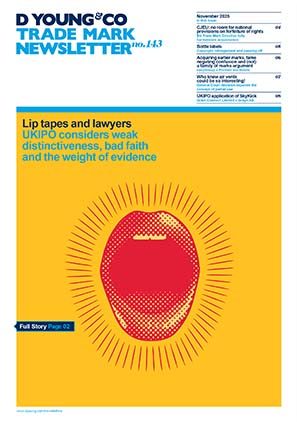Lidl v Tesco: Court of Appeal allows bad faith claim to proceed
The Court of Appeal has granted Tesco’s appeal against an order of the High Court, striking out allegations in its defence and counterclaim that Lidl had applied for registration of certain trade marks in bad faith.
Background
In the High Court proceedings, Lidl claimed Tesco’s use of its “CLUBCARD PRICES” sign (shown below, right) amounted to trade mark infringement of its own mark “the wordless mark” (shown below, left). Both the sign and mark are based on a yellow circle on a blue square background.

Tesco counterclaimed for a declaration of invalidity of the wordless mark on the basis that it had never been used, that Lidl had never intended to use it, and hence that the intention when registering it was to use it as a legal weapon in bad faith.
Tesco further argued that Lidl had abused the trade mark system, and “evergreened” by applying to re-register the wordless mark in 2002, 2005, 2007 and 2021, which was further evidence of bad faith.
These arguments were struck out by the High Court.
The appeal
In its appeal, Tesco relied on two grounds.
- The judge had failed to apply the correct test to the striking out application under rule 3.4(2)(a) of the Civil Procedure Rules, and that it had also failed to take into account that bad faith is a developing area of the law.
- The judge had failed to properly consider the pleaded facts and inferences of the bad faith claim as a whole.
The decision
Whilst it disagreed with Tesco’s argument that the wrong test was applied by the judge, the Court of Appeal agreed that the judge had failed to consider that bad faith was a developing area of law. However, this alone would not have been sufficient justification for interfering with the judge’s decision.
The Court of Appeal also agreed that Tesco’s second ground for appeal was well founded, especially considering that no disclosure as to Lidl’s intentions when registering the mark had taken place yet.
The High Court judge was wrong to say that Tesco’s allegation (that the wordless mark was applied for solely for deployment as a legal weapon) was “no more than assertion”, as all allegations in statements of case are assertions as to facts. It was no objection that this allegation was pleaded as an inference. It was open to Lidl to produce evidence as part of a summary judgment application to show that this factual assertion was unsustainable, but it did not. Furthermore, Lidl could not disprove this inference by simply counter-asserting that it was entitled to a wider scope of protection than that provided by the mark with text; a factual investigation into the reputation and goodwill that its mark enjoyed was required.
In relation to Tesco’s claims of Lidl abusing the trade mark system, the Court of Appeal considered that seeking unjustifiably broad protection may amount to such abuse, but that whether it constitutes bad faith is a fact-sensitive question which depends on the applicant’s intentions. The Court of Appeal disagreed with the judge, and found that Tesco’s pleading did give rise to a real prospect of the presumption of good faith being overcome. Furthermore, the Court of Appeal disagreed with the judge’s finding that Tesco’s failure to plead in relation to the mark with text was significant; the judge had failed to recognise that Tesco’s case was based on more than the mere existence of overlapping marks. Hence, Tesco’s pleading of abuse of the trade mark system by Lidl did have a real prospect of success.
Regarding the claim of “evergreening”, the Court of Appeal found that Tesco had done enough at this stage by giving particulars of the allegation by way of a spreadsheet of the re-registrations, and confirmed that this plea had a real prospect of success.
In short
This decision reaffirms the high threshold for strike out applications, especially considering the high threshold of proof required for the underlying counterclaim of bad faith. Whilst Tesco was successful in showing that this counterclaim has a realistic prospect of success, the question of whether it is successful or not will be determined at the main proceedings in 2023.
Case details at a glance
Jurisdiction: England & Wales
Decision level: Court of Appeal
Parties: Lidl Great Britain Limited and Lidl Stiftung & Co KG v Tesco Stores Limited and Tesco PLC
Date: 25 October 2022
Citation: [2022] EWCA Civ 1433

